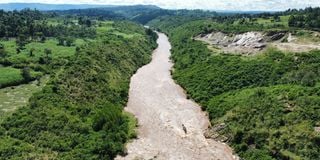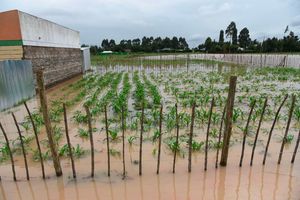The slow death of River Nzoia Basin

River Nzoia, which stretches 257 kilometers, is under increasing pressure from climate change and pollution.
What you need to know:
- The Nzoia River Basin is home to a significant portion of Kenya's flora and fauna.
- It encompasses forests, riparian areas, farmlands, grasslands, floodplains, wetlands, and parts of the open waters of Lake Victoria.
Growing up in Namulata Village, Webuye East, Samwel Namulata would swim in the pristine waters of River Nzoia, catching fish with his bare hands. But five decades later, Samuel, a resident of Nzoia River Basin, can only reminisce about those fond memories as he witnesses the sad state of the once mighty river.
Samuel still has vivid memories of hippos, crocodiles, antelopes, and guinea fowls playing and swimming in the river. “Now at the age of 53, I can hardly find any fish in the river. Wild animals have also disappeared," says Samwel, sharing experiences of the degraded river that is under increasing pressure from climate change and pollution.
River Nzoia, stretching 257 kilometers, was once a powerful river system within the Lake Victoria Basin. But today, it is a shell of its former self, resembling a mere stream. The river’s banks have enlarged over time and wildlife has vanished from the threatened ecosystem, thanks to long-term degradation and climate change.
Dr Makokha Wanjala, an environmental researcher, notes that the Nzoia River Basin was once a haven of biodiversity, comprising forests, farmlands and wetlands. It provided habitats for various species and played a crucial role in the ecosystem. The river was also a vital source of water for livestock, irrigation and domestic use.
"Let us not forget the voiceless species that have suffered the most due to our actions. It is the high time we prioritise their protection and work towards restoring the fragile biodiversity that once thrived within the river basin," says Dr Wanjala.
Reverend Harman Kasili , a local church leader, says: "We need to take immediate and decisive action to restore the river basin. It is our duty as custodians of nature to address pollution, deforestation, and unsustainable practices that have brought us to this point.”
The Nzoia River Basin is home to a significant portion of Kenya's flora and fauna. It encompasses forests, riparian areas, farmlands, grasslands, floodplains, wetlands, and parts of the open waters of Lake Victoria. It houses 9.3 per cent of the country's known species, with 95 species endemic to Kenya and 42 globally threatened. Birds and reptiles find refuge in this biodiversity hotspot - 58.3 per cent of Kenya's bird species and 45 per cent of reptiles inhabit the area.
However, the river has experienced habitat loss caused by pollution, overpopulation, industrialisation, urbanisation, and encroachment on forests and wetlands.
One of the main culprits is the now-defunct PanPaper industry, which used to release untreated waste into the river, causing extensive damage to the ecosystem. Fishing has also been severely impacted, with dead fish and polluted water stretching 20 kilometers downstream from Webuye Sub-county in Bugoma County.
"The devastating effects of the defunct PanPaper industry on Nzoia River cannot be overstated. The damage caused by the paper milling factory’s untreated waste has impacted not only our livelihoods but also the delicate balance of nature within the basin," states Dickson Kibisu, a former employee of the paper mill.
The factory was notorious for its foul and musty sulfur smell that engulfed Webuye town and its surroundings. Although it has scaled down operations due to mismanagement and corruption, the environmental damage remains. Further, deforestation caused by the industry has left the land barren, with eucalyptus trees replacing indigenous ones.
Residents of the Nzoia River Basin have also contributed to the degradation through activities such as sand mining, deforestation, stone quarrying and riverbank cultivation.
Sand mining, in particular, has led to riverbed widening, reduced biodiversity and increased pollution. Quarrying has transformed riverbeds into pits, depleting groundwater tables and destroying riparian wetlands. Dust from the quarries contaminates water and damages aquatic species.
"Sand mining has become a destructive force on our beloved river. The widening of the riverbed and loss of vital habitats for aquatic species is a tragedy that we cannot ignore any longer," says Dr Makokha, adding: “The government must implement regulated sand mining policies and search for alternatives in construction to reduce the demand for sand. Restoration efforts should involve collaboration between the Ministry of Environment, and the Ministry of Tourism along with the local communities. Conservation programmes and pollution control measures should be introduced, and sustainable practices implemented.”
Alex wanyonyi, a local environmental activist, says: "The degradation of the river is not just a loss for our community but for the entire ecosystem. The disappearance of wildlife, like the majestic hippos and graceful antelopes, is a stark reminder of how our actions have ravaged our natural heritage.”
Reverend Kasili says reclaiming closed quarries and reforesting degraded areas should be prioritised to prevent further damage. “Conservation of non-commercial native fish species within River Nzoia is crucial, and it requires comprehensive efforts.”
According to a study titled 'Environmental Effects of Quarrying' by Xavier University, quarrying transforms riverbeds into large, bottomless pits. As a result, the groundwater table drops, and water table-dependent woody vegetation in riparian areas is strained, decreasing riparian wetlands.
"The plight of River Nzoia should serve as a wake-up call for all of us. We must come together - government, communities, and industries- to find sustainable solutions and heal our wounded river," urges Winny Musa, a member of Nabuyole lodge village.





